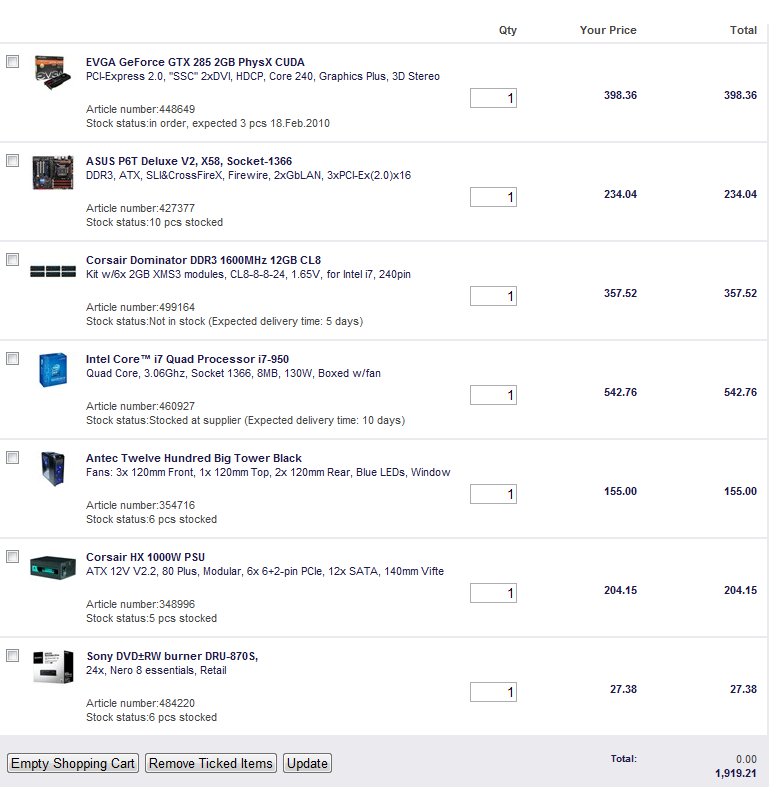Back in the 90’s there was a distinct difference between PCs and consoles, with PCs being signficantly stronger and offering much more customization. Recently however, consoles are becoming more and more like PC’s with hard drives, internet connectivity, stronger hardware, and even an OS of sorts, such as the Dashboard for the 360. However, they’re still different enough such that the PC versions of games usually have much more options, and are able to output graphics at higher settings. The increased connectivity also allows games such as Team Fortress 2 to be patched and updated very quickly. But with that said, consoles provide extremely good performance for the price, sometimes offering games with visuals above and beyond even what a medium gaming PC can do.
But here lies the problems. While consoles certainly give good bang for buck and are easy to use, they become trapped in time and end up abandoned later on as developers move to the next generation of hardware. There are no 360 games, even the worst looking ones, that can run on the original Xbox. The unique architectures of consoles also make them fairly hard to code for, especially in the first couple of years.
Gaming PCs on the other hand are very expensive, and a single component upgrade can cost more than an entire console. PC developers are also unable to optimize games as fully as is possible on consoles. Look at games like Killzone 2 and Uncharted 2; arguably some of the best looking games on any platform, they are able to run on what is essentially 4-5 year old hardware. This is because the PS3 is a fixed platform, and the number of optimizations that can be done on a fixed platform with expert developers would blow your mind.
While games such as Crysis look better than anything available on consoles, they also require far more hardware power to do so. Factor in vastly different hardware configurations, driver issues, Nvidia vs. Ati based coding, and different versions of standards such as DirectX, there’s simply no way for developers to optimize a game in the way they can do a console, making PC comparatively powerful, but very inefficient at what it does.
Due to the above disadvantages of consoles and PCs, I’m proposing the concept of a PC-console hybrid platform. This would be a highly modular machine with consumer-friendly input slots of key components such as graphics cards, processors and hard drives. It would use current (or future) computer standards of connectivity such that any future upgrades would be easily implemented on the machine, and doing so would be no harder than inserting a cartridge into an SNES.
It would first be sold essentially as a console, but its modular nature would then allow for specialized future upgrades provided by the parent company such as graphics cards, much like how Nintendo’s peripherals such as the Wii Motion Plus and Wii Balance Board work. These custom upgrades could be provided by the parent company x-annually, much like how the Xbox 360 is getting Natal about halfway through its life cycle or how the Wii got MotionPlus a couple of years into its. In a way similar to the N64 expansion pack but much better supported. Look at it as upgrading from a Nintendo DS to a DSi, but without having to actually rebuy an entire machine and at much less of a cost proportionally.
This would provide a somewhat uniform platform for developers to develop on, while at the same time maintaining a high degree of hardware strength. The cost of buying these “peripherals” can be offset by the money saved on games due to digital distribution, which would in turn be far more feasible due to larger hard drive space and a more desktop-based OS. If Microsoft were to make such a machine they could implement Windows on it for example.
The advantages of a PC-console hybrid include:
- Reduced cost to PC gamers due to mass production; no more $2000 gaming machines necessary to play the latest games at max graphics. Would not be significantly more expensive for people who prefer consoles either.
- Fixed platform, allowing for the optimization seen in current consoles.
- Much stronger hardware available in consoles. A game as well optimized as Uncharted 2 with 10 times the hardware power would truly be a sight to behold. Modular structure would also allow self-upgrades of things such as the hard drive to anything you want.
- Reduced cost to developers; the cost of developing multiplatform scales almost linearly with the number of extra platforms involved. With just one platform, and one that is under a standard that most developers would agree to (such as DirectX), the cost of development would go down and even more and better could content could be implemented into games.
- Easy implementation of future standards; the next DirectX version would require merely a download.- Introduction of computer technology to the mass market.
- Brings digital distribution to the consoles in a big way; Steam on a console? Hell yes.
- Tying into digital distribution, cost of buying games goes down.
- Would be able to support any controller configuration you want, including keyboard and mouse, joystick, 360 controller etc.
- Indefinite lifespan.
There are probably disadvantages to this idea as well, but at first I would say that the given obvious advantages far outweigh any possible disadvantages, and that such a system would greatly benefit gamers currently on PC’s and consoles alike.




Log in to comment